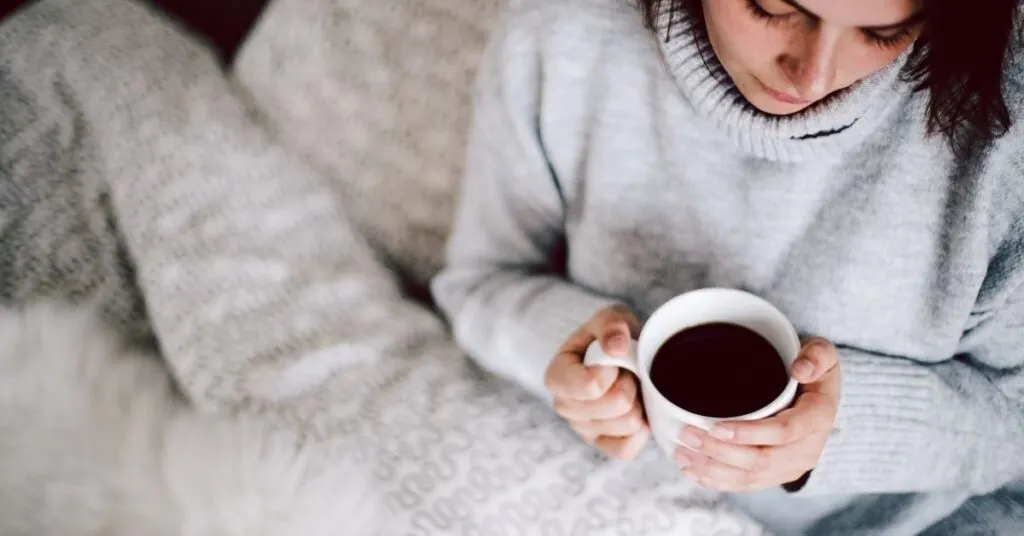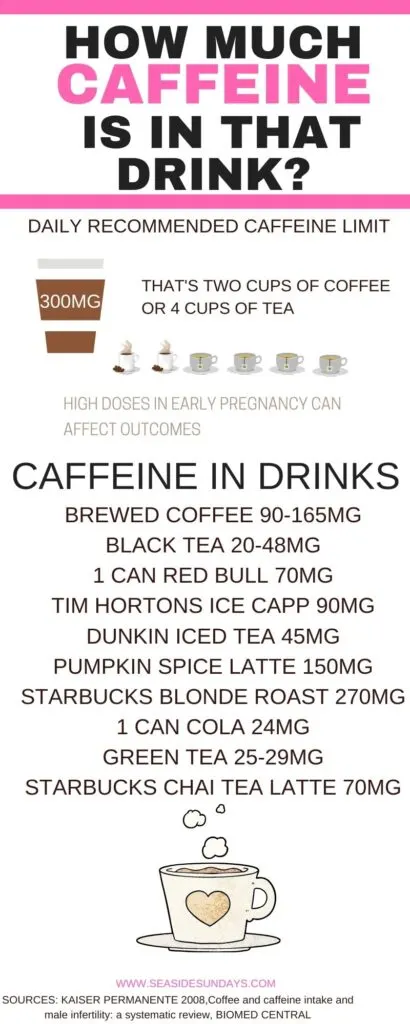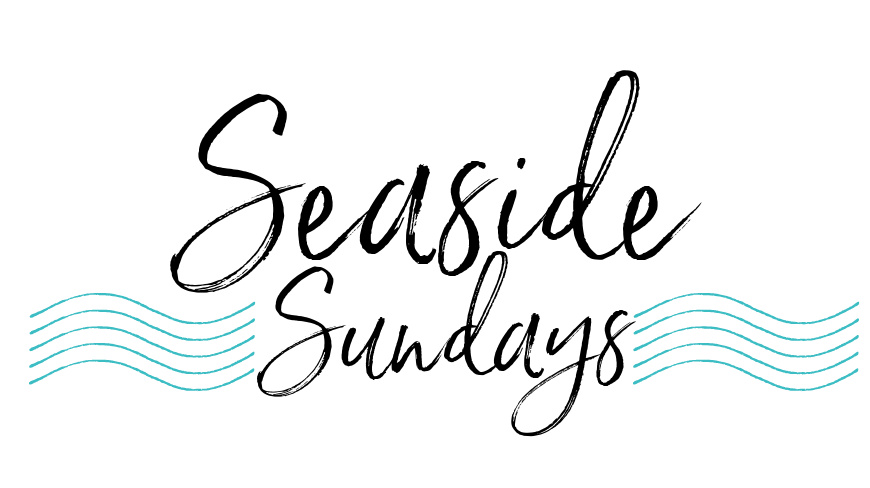Could your daily cup of coffee be the reason you are not getting pregnant? If you are trying boost your fertility naturally, you have probably wondered about the relationship between fertility and caffeine and whether it is reducing your chances of conceiving.
Part of a healthy lifestyle if you are trying to conceive, is to eat a nutritious fertility diet, exercise and if desired, to take additional vitamins and supplements to boost your chances of getting pregnant.
But do you really need to give up your Starbucks to get pregnant?

This page contains affiliate links meaning I earn a commission if you use those links, please see my disclosure for more information.
RELATED POSTS
Fertility Breakfast Smoothie To Help You Get Pregnant
Soda And Fertility – What You Need To Know
Does caffeine affect female fertility?
There are two things to consider when you are looking at how caffeine could affect your chances of getting pregnant:
- Does caffeine actually cause infertility? ie. will drinking coffee stop you from getting pregnant?
- Should you cut down on coffee when trying to get pregnant because of potential early pregnancy risks?
I separate these two issues because, as you will see below, there have been many studies on the effects of excess coffee and fertility/pregnancy and I think it is worth considering all the risks before you decide to give up your morning cup of joe.
RELATED: The Best Foods That Increase Fertility
Studies on Caffeine and Fertility
The coffee and fertility debate all started in 1988 when a study was published that seemed to show a strong correlation between caffeine intake and conception rates in women.
In the study, 104 women who had been trying to get pregnant for 3 months were interviewed and tracked to see when they fell pregnant naturally.
The study concluded:
“Women who consumed more than the equivalent of one cup of coffee per day were half as likely to become pregnant, per cycle, as women who drank less.”
Source: Lancet 1990 Wilcox et al.
There have since been many studies done but none have been able to replicate the 1988 study’s findings and in fact, some have disproved any link between caffeine and fertility at all.
The latest research I can find is a Danish Study from Feb 2018 that showed no link whatsoever between infertility and caffeine intake:
7574 women were followed for primary infertility from the date of enrollment (1991-1993) until 31 December 2010.
Conclusion: In this population-based cohort study, not restricted to women seeking pregnancy, we found no association between coffee, tea or total caffeine consumption and the risk of primary infertility in women.
Source: 2018 Nordic Federation of Societies of Obstetrics and Gynecology.
Does caffeine affect early pregnancy?
One reason why I personally cut back on caffeine while trying to get pregnant is because of the results of a 2008 study by Kaiser Permanente in the USA.
The study showed that “high doses of daily caffeine during pregnancy – whether from coffee, tea, caffeinated soda or hot chocolate — cause an increased risk of miscarriage“.
Given that you may not know you are pregnant until you are around 3 or 4 weeks along, it is likely good practise to limit your caffeine intake while trying to conceive based on the results of this study.
READ NOW: 10 Smart Products That Can Help You Get Pregnant
What are the safe levels of caffeine for fertility & early pregnancy?
From the studies above you can probably see that while there is likely no need to completely cut out caffeine, it is probably advisable to limit your daily intake.
The Kaiser Permanente study cited above also goes on to say that:
“women who consumed 200 mg or more of caffeine per day (two or more cups of regular coffee or five 12-ounce cans of caffeinated soda) had twice the miscarriage risk as women who consumed no caffeine”
Most experts agree that a safe level of caffeine is around 200 to 300 milligrams per day. That is equivalent to one large coffee or 4 cups of tea.
Though the ideal is lower, the safe zone does not exceed 300mg.
Here are a few common drinks and their caffeine levels from The Mayo Clinic
All caffeine levels are based on a normal 8oz serving size:
Brewed coffee – 95-165mg
Decaf coffee- 2-5mg
Black tea- 25-48mg (depending on steeping time)
Green tea- 25-29mg
Cola (I can) – 24mg
Red Bull (1 can) – 77mg
Since coffee shops and coffee brands differ, you will need to look at the nutrition facts on your coffee to determine how many cups a day this equals for you.
I was also curious about the caffeine amounts in some of the drinks at my favorite coffee shops and I was kind of surprised at the results:
Starbucks (all amounts are for a tall size drink) – you can see all the sizes on the Starbucks website
Starbucks Chai Tea Latte – 70mg
Iced Coffee Blend – 120mg
Blonde Roast – 270mg
Low or Caffeine-free alternatives at Starbucks
Teavana® Shaken Iced Passion Tango™ Tea – 0mg
Peach Tranquility® Herbal Tea – 0mg
Dunkin’ Donuts (all amounts are for a small drink- 16oz) see more information here.
Brewed coffee – 150mg
Iced Tea – 45mg
Decaf iced coffee – 18mg
Low or Caffeine-free alternatives at Dunkin
Decaf Latte – < 5mg
Hot chocolate – 12mg
Tim Hortons (all amounts based on a small size)- see here for more information.
Original roast coffee – 140mg
Cafe mocha – 90mg
Ice capp – 90mg
Iced coffee – 60mg

The link between caffeine and male fertility
Male infertility makes up 30% of all infertility diagnosis nowadays so it stands to reason than men should also be aware of what they are eating and drinking and how that could affect their partner’s pregnancy outcomes.
An amalgamation of studies done in 2017 concluded that excessive amounts of caffeine can have a damaging affect not only on sperm quality (the number one factor in male infertility) but also, sperm DNA which can cause infertility or other issues such as miscarriage or chromosomal issues.
The most damage seems to be in conjunction with smoking or alcohol and several of the tests highlighted the impact of cola drinks and caffeinated energy drinks as a possible reason for the DNA damage.
As with caffeine and female fertility, men should probably stick to a maximum of 300mg a day for optimal fertility.
RELATED: The Best Ways To Naturally Boost Male Fertility & Increase Sperm Count
Cold Brew for Acid Reduction
Acid intake in drinks is another reason there is a huge debate regarding caffeine in the diet for fertility issues. Most drinks that contain a high amount of caffeine also cause a high amount of acid to enter the system.
If you are a huge coffee drinker, consider a cold brew alternative. The caffeine is usually lower and the acid is all but gone from the drink when cold brew methods are used. You can still heat up the finished product.
Coffee substitutes that may help fertility
If you are concerned about the link between fertility and caffeine and you want to reduce your intake, consider some alternatives to strong coffee.
For example, switching from coffee to hot tea is an ideal option since the tea can be dosed out in easier more accurate amounts. Many herbal teas are caffeine free and you can also get decaffeinated black and green tea.
Even caffeinated tea is much weaker than coffee so you can still get a caffeine hit in the mornings without the negative affects of the coffee on your fertility.
There are some herbal teas that may actually help you get pregnant as they are packed full of fertility herbs such as vitex, and ginger. The best selling ones are Fertilitea and Pink Stork Fertility Tea.
Read more about using herbal teas to increase fertility naturally.
Making Your Coffee Healthier

If you just can’t give up the coffee and want to keep it in moderation, why not make it healthier?
I’ve recently started drinking The Chagaccino from Renude and it is a great way to make my morning cup of Joe taste great! This mushroom-based coffee-boosting powder is clean, organic and zero sugar.
You just add it into your regular cup of coffee for a delicious and healthy treat!
Chaga is a mushroom that has more antioxidants than other fertility superfoods such as acai, pomegranate and blueberries!
It is great for hormone imbalance, boosting immunity and relieving stress, all possible reasons for infertility.
Seaside Sundays readers can try Renude for 15% using promo code seaside15 at their website.
Conclusion: Should you quit caffeine cold turkey?
Quitting caffeine suddenly, especially if you drink a lot right now, is probably not a good idea.
Going cold turkey can cause problems like severe headaches, nausea, and digestion issues. If you decide to eliminate caffeine completely, it’s best to gradually cut down your intake over a period of days. This way you will avoid any withdrawal symptoms.
I really don’t think you have to give up your one cup of coffee a day if you don’t want to.
Research shows that it is excessive amounts (over 300mg a day) that really cause the link between caffeine and infertility.
FREE Fertility Resources (Ebooks, Checklists and more)
Click the links to instantly download the following useful resources, at no cost!
FREE Ebook: How to Improve Your Egg Health
FREE Report: How To Improve Sperm Health
Report: Preventing Miscarriages
FREE Ebook: Restore Fertility & Get Pregnant Naturally
Free Checklist for IVF
More fertility tips
Is The Keto Diet Good For Fertility?
The Best Ways To Naturally Boost Male Fertility & Increase Sperm Count
The Best Fertility Yoga Poses For Men & Women
Free 14 Day Fertility Meal Plan!

Boost your fertility with this 14 day kick start program
Sign up for instant access to this free plan & more fertility tips


